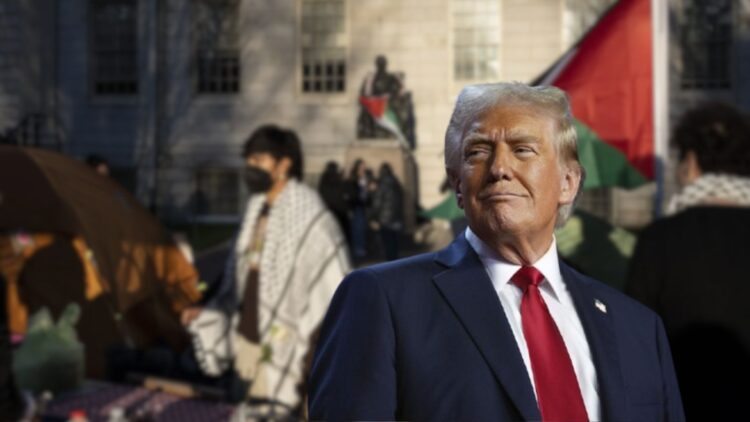Harvard University has rejected a long list of demands made by the Trump administration. These demands included removing its diversity, equity and inclusion (DEI) programs, changing how the university admits students and hires staff, banning face masks on campus, and cooperating fully with immigration authorities. The university said that these conditions were an attempt to control its independence.
In response, the Trump administration announced it would freeze more than $2.2 billion in federal grants and contracts for Harvard. This includes $2.2 billion in grants and $60 million in contracts that were already approved but not yet delivered.
The White House and the Department of Education claim that the decision is part of their efforts to fight antisemitism on university campuses. Officials said they are worried about rising incidents of antisemitic behavior and student protests that are turning hostile. According to them, universities like Harvard have failed to protect Jewish students, especially during recent protests against the war in Gaza and US support for Israel.
The administration also accused Harvard of having an “entitlement mindset,” meaning the university believes it can take federal money without following federal rules. Officials from the Department of Education and the federal antisemitism task force said that if Harvard wants taxpayer money, it must follow civil rights laws and make necessary changes.
What Exactly Did the Trump Administration Demand?
The list of demands sent to Harvard was wide-ranging. Here are the main points:
- Remove all DEI programs and stop using race or ideology in hiring or admissions.
- Review all faculty and student views on diversity and make changes if necessary.
- Ban the use of face coverings on campus, which many saw as targeting pro-Palestinian protesters.
- Stop funding or supporting student organizations accused of supporting illegal activity.
- Cooperate fully with federal immigration enforcement.
- Make changes in leadership and university governance.
These demands, according to the administration, were aimed at making campuses safer and less politically biased. But many experts and civil liberties organizations believe the demands go too far.
Harvard Responds: ‘We Will Not Be Controlled’
Harvard’s response was firm and clear. The university released a public statement and a legal letter rejecting the administration’s demands. It said that accepting the demands would allow the federal government to take over a private university, something it says is against the Constitution.
“Harvard will not surrender its independence or give up its constitutional rights,” the letter said. However, the university did say it is open to discussions on how to make campus life better for all students.
Former US President Barack Obama praised Harvard for standing up to the administration. In a social media post, he said the university is protecting academic freedom and intellectual debate, and he hoped other institutions would follow Harvard’s example.
Just hours after Harvard rejected the demands, the Department of Education made it official: all funding to Harvard would be frozen. The government said it is unacceptable for universities to take federal money and ignore federal law. It said that harassment of Jewish students on campuses would not be tolerated anymore.
The Joint Task Force to Combat Antisemitism, created by the Trump administration, also criticized Harvard strongly. They said the university was acting like it was above the law and refusing to take civil rights violations seriously.
This move is part of a larger effort by President Trump to crack down on what he calls “woke” universities. Trump has often criticized top universities for allowing student protests that he says are hostile toward Jewish students and supportive of terrorism.
Last year, campuses like Columbia University saw large pro-Palestinian protests. Students called for an end to US support for Israel and asked universities to cut ties with the Israeli government. Trump responded by demanding universities stop these protests, and Columbia later made several changes to satisfy the administration. This included banning face masks and hiring more campus officers.
Some students and organizers involved in these protests have even been arrested by immigration officials, leading to new concerns about freedom of speech on campuses.
Several civil rights groups and the American Association of University Professors have filed lawsuits against the Trump administration. They argue that the administration is abusing civil rights laws like Title VI to push its own political agenda.
The lawsuits claim that the government’s list of demands is vague and politically motivated. They say the administration is not just fighting antisemitism but trying to control what students and teachers can say and believe.
Many Harvard faculty, alumni, and civil society groups have also criticized the government’s move. They say that universities should be places for open discussion, not political interference.
More Universities Could Be Targeted
According to reports, the Trump administration has warned over 60 other universities that they could face similar investigations and funding cuts if they do not follow federal guidance on campus policies. Some officials inside the government have said they are using Harvard as an example to make other schools fall in line.
By cutting off federal funds, the administration hopes to pressure universities to eliminate programs and student groups that it sees as biased or dangerous.
This clash between Harvard and the Trump administration is not just about money. It’s about who controls America’s education system – the universities themselves or the federal government. Harvard’s bold decision to reject the demands has turned it into a symbol of resistance for those who believe in academic freedom. But it has also made it the first target in what could become a much bigger national fight over politics, free speech, and education.

















Comments